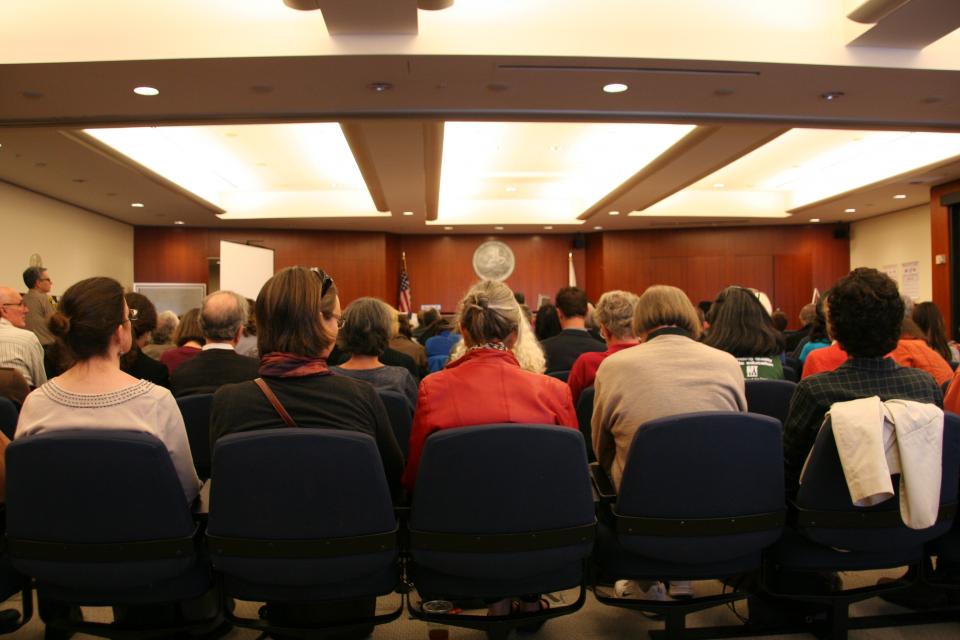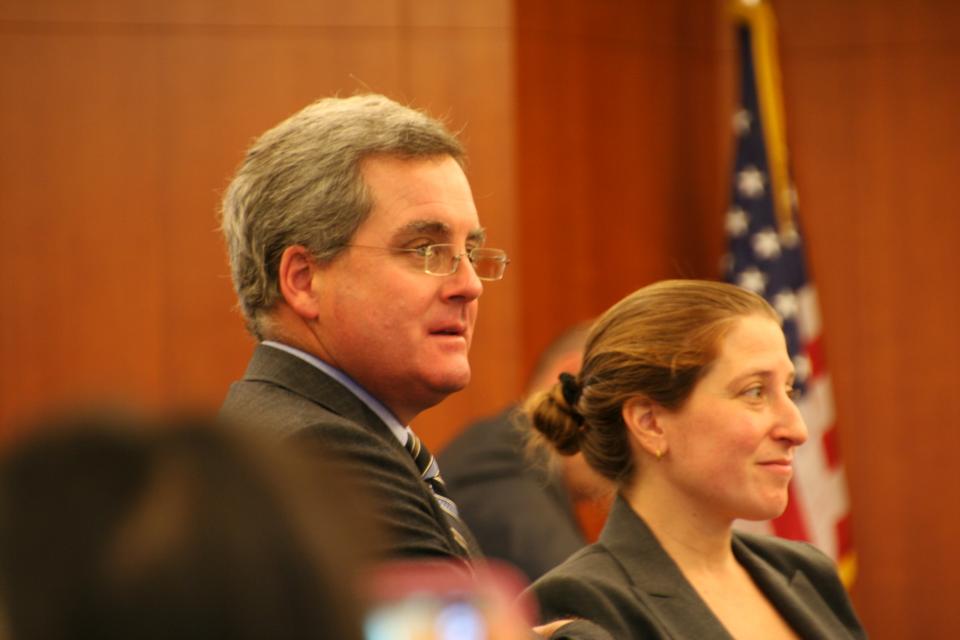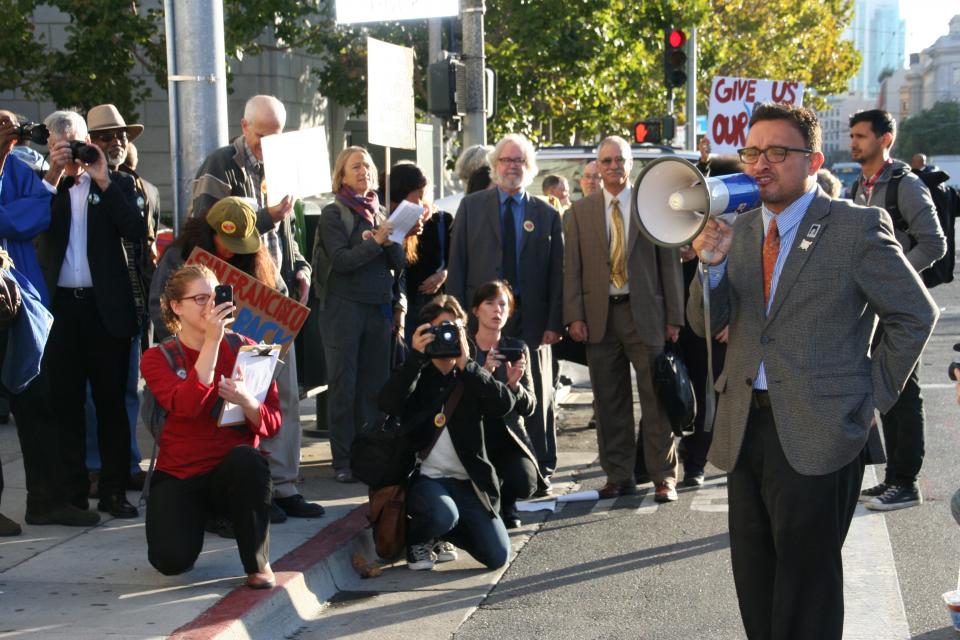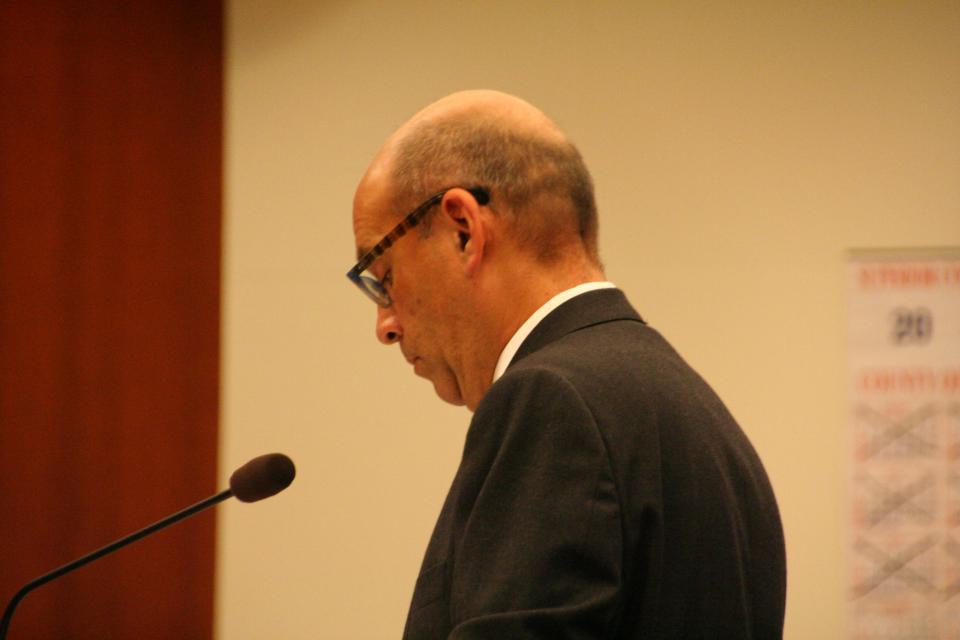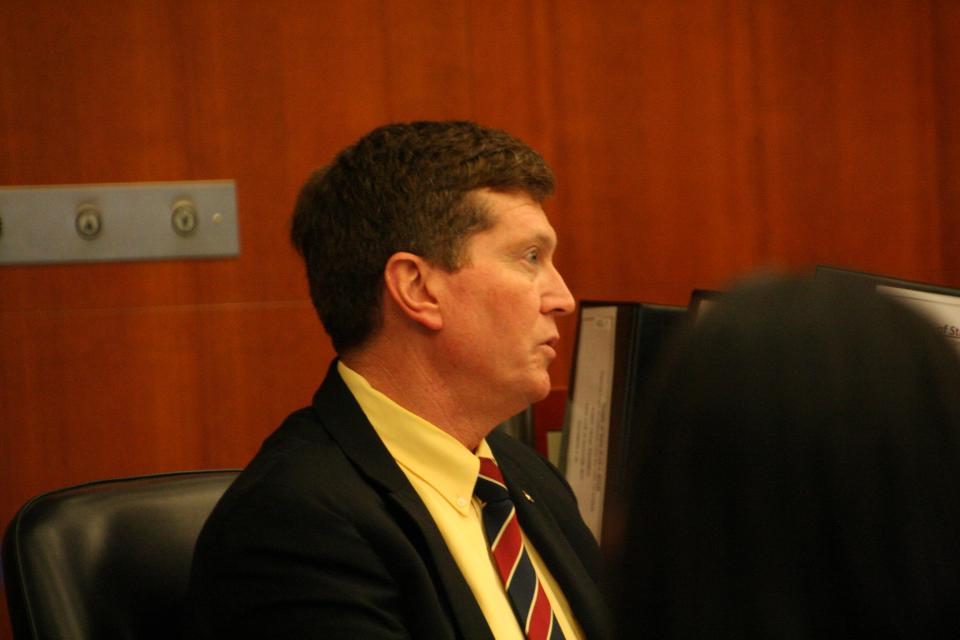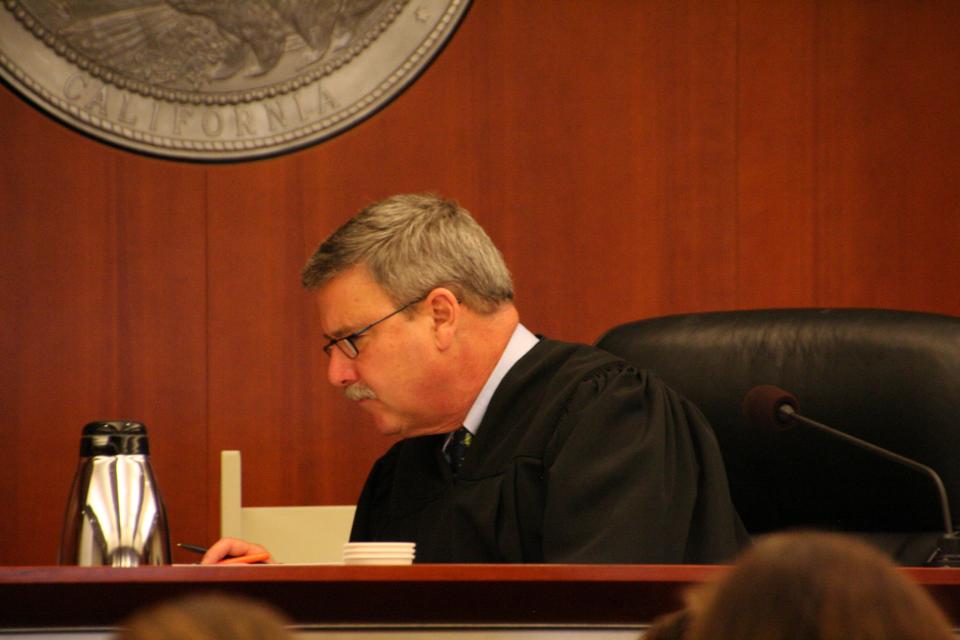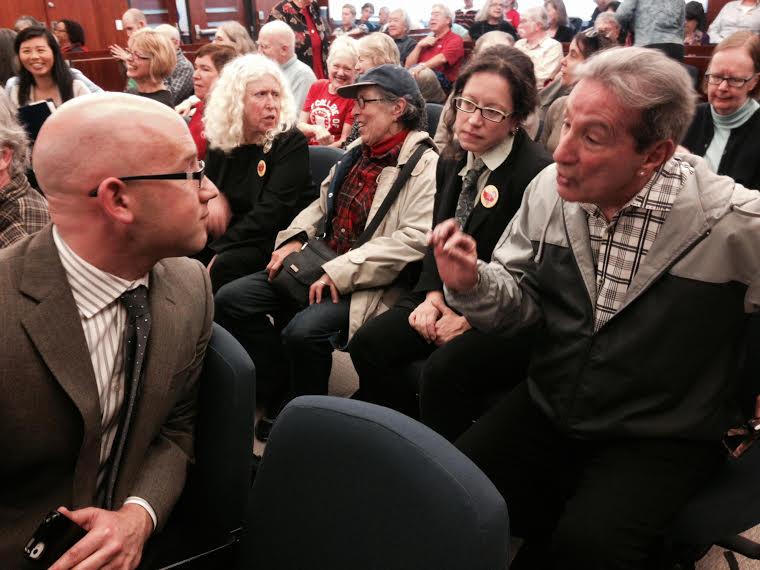Day One: October 27, 2014
San Francisco—After kicking off the day with a spirited early morning demonstration outside the San Francisco Superior Court building, about a hundred City College of San Francisco faculty, students and community supporters moved en masse into the courthouse to attend the opening day of the trial to keep the college open.
They heard Deputy City Attorney Yvonne Mere deliver the opening argument. She began simply, with “This case is about fairness.” For the next half hour she told Judge Curtis Karnow that the People’s case would prove three things: that the Accrediting Commission for Community and Junior Colleges violated federal regulations and their own policies when it failed to control for conflicts of interest; it failed to create site review teams that were adequately balanced with academics and administrators; and it failed to give due process to City College.
She also noted that the ACCJC acted in violation of California law when it failed to follow the law and its own procedures; that it deprived CCSF of the opportunity to participate in a process of peer review; and that it acted unfairly when it chose to evaluate CCSF while embroiled with the college in a very public debate over the future of the mission of community colleges in California.
Beno overstepped
After outlining how the People would present their case, she charged that ACCJC President Barbara Beno far overstepped her role as a reader of the site review team’s report on CCSF, a role which is meant to be limited to correcting grammar, spelling, and logic. Instead, she asserted, Beno made serious changes of substance by removing praise and language regarding the college’s compliance with accreditation standards.
After spending a great deal of time setting up an easel, the ACCJC’s lawyers presented an overview of the accrediting process, and said that CCSF did not meet the standards necessary to be reaccredited in 2012 and 2013. They charged that CCSF didn’t pay attention to recommendations delivered to the college as early as 2006, and said that the college had been in “perilous financial condition.”
They asserted that the college lacked capacity to deal with its problems due to its “dysfunctional” Board of Trustees, which instead of engaging in proper governance through votes attempted to assert influence over the college improperly through direct contact with members of the college community. The presentation, featuring large printed charts placed on the easel, lasted considerably longer than the City Attorney’s, and concluded with the proposition that the college had had many opportunities to engage in due process, to appeal the ACCJC’s “show cause” and termination orders, could sue in federal court if it had so chosen, and was just about to have yet another opportunity to show its fitness for staying in business through a site review about to begin in a couple weeks through the brand new “restoration status” process.
Messer testifies
Before lunch, the City Attorney’s team called to the witness stand CCSF English instructor and former faculty union president Alisa Messer. Messer described the diverse student body at the college, and the broad open access mission to which the college’s faculty, administrators, student leaders and governance bodies were committed. “Keep the doors open,” she said, was the motto of the college during the Great Recession, as faculty and students attempted through organizing to fend off the worst recommendations of the statewide Student Success Task Force in 2011 and 2012, which would have resulted in a considerable narrowing of the college’s mission.
Messer then recalled the shock she and many other faculty felt when they discovered after the fact that Peter Crabtree, a member of the site visit team assembled by the ACCJC in 2012, was the husband of Barbara Beno. Upon questioning by Mere she said it was pretty clear to faculty that this was at the very least the appearance of a conflict of interest: how could anyone reasonably believe that Beno and Crabtree had had no dinner talk about the topic of CCSF’s accreditation?
During the lunch break, a media scrum boiled in the hallway outside the courtroom. Messer was set upon by a ring of cameras and microphones (watch the news tonight!) the instant she came out of the courtroom. CFT president Joshua Pechthalt, AFT 2121 president Tim Killikelly, and CFT attorney Robert Bezemek likewise contributed their views to the news.
In the afternoon the City Attorney’s team called to the witness stand State Community College Chancellor Brice Harris, former CCSF administrator Peter Goldstein, and California Community College Independents president Rich Hansen.
Harris: Good teaching and learning
State Chancellor Harris interpreted for the courtroom the numbers in the Student Success Scorecard, a report published annually by the California Community College Board of Governors. The City Attorney’s lawyers presented slides of the data in the report, which is a performance measurement system tracking student achievement in all 112 community colleges in the state.
In Harris’s view, the Scorecard is an accurate measure of student success in various ways. This is important for the People’s case, since CCSF scored at or above the state average in many categories at the time the college was being evaluated. Harris stated flatly that “There was a lot of good teaching and learning going on [at CCSF],” and “teaching and learning at CCSF continues to be excellent and gets better all the time.” He said that in his opinion the action taken by the ACCJC was stronger than it needed to be, and that he appointed the “supertrustee” to take control over the college only because Barbara Beno had led him to believe that it was the only path to saving the college’s accreditation.
Peter Goldstein, who oversaw the college’s budget for many years, testified that the reason the college had a $17 million “deficit” in June of 2011, cited by ACCJC as evidence that the college’s finances were in desperate straits, was that the state of California was late in making its $25 million apportionment payment, which arrived a month later. He also stated that CCSF had appropriate levels of financial reserves throughout the Great Recession.
The last witness of the day was Rich Hansen, president of the California Community College Independents. He testified about the reaction of faculty to SLOs going back to the early 2000s, and about his participation as a member of the Student Success Task Force. He pointed out that 50% of the turnout at some of the big public hearings around the state comprised CCSF faculty, students, administrators and trustees.
Looking back over the day’s events, AFT 2121 president Tim Killikelly said, “The basic issue in this case is fairness. Is it fair to close down a college of 80,000 people, the educational quality of which is not in question? We hope the trial that began today will help create a fair and transparent accreditation process for City College of San Francisco and all the community colleges in California. That’s why we’re here today.”
Day Two: October 28, 2014
In what could be a decisive moment in the City College trial, the head of the ACCJC admitted today that the agency’s decision to yank accreditation from City College violated the agency’s own standards and denied due process to the San Francisco school.
Barbara Beno, president of the accrediting commission, also admitted that she personally edited the report of the visiting team responsible for evaluating the school, and that her changes – which were detrimental to City College – were adopted in the final document.
Among those changes were the removal of language stating that the school administration, faculty, and board had shown “a high level of dedication, passion, and enthusiasm and provided compelling evidence to address the issues” that lead to a loss of accreditation.
Under the ACCJC’s rules, Beno — a staffer, not a commission member — should have had no role in deciding whether City College kept its accreditation.
She also denied that the commission’s decision to put her husband on the team that evaluated City College was a conflict of interest – and insisted that she had never once discussed the school’s accreditation with him. That, one City College supporter told me, “strains credulity.”
Beno was on the stand for more than two hours, and at times, it felt as if Deputy City Attorney Ron Flynn was a dentist pulling a painful and deeply impacted molar. Over and over, Beno resisted answering the questions. Over and over, she ducked and diverted and tried to avoid the key admission.
But Flynn persisted, taking Beno methodically through the ACCJC’s own processes, outlined in the agency’s own policies and procedures manual. A January, 2011, version of that manual notes that colleges subject to the panel’s oversight have the right to due process.
Here’s the key point: When the ACCJC sends a team to visit a school, that team – made up of volunteers who are supposed to be peers of the institution – writes up a report and makes recommendations. The school gets a copy of the draft report and has the right to respond.
But if the full commission recommends sanctions that are tougher than what the visiting team wanted, and bases that decision on information and conclusions not in the team report, the rules say the school gets additional time to respond in writing to that decision.
In this case, there’s no question that the visiting team recommended probation, a lower sanction than the “show cause” that led to the loss of accreditation. The final report of the ACCJC – after Beno’s edits – was changed; some areas in which the team said City College met the applicable standards were changed to say that the school failed to meet those standards.
And the termination report, everyone agrees, included new charges that City College never had a chance to challenge. That would certainly appear to be a violation of the ACCJC’s own rules.
Duck and cover
Three times, Flynn asked Beno: Did the ACCJC follow its internal standards and afford City College additional time to respond to the new claims?
At first, she tried to change the subject. Then she said that she thought the ACCJC did, indeed, let City College respond.
Flynn went through the time frame again, demonstrating that Beno was wrong, and repeated his question: “After the commission imposed termination, did it afford City College extra time to respond?” Flynn asked.
Beno paused. Finally, she looked up and said: “No.”
Tim Killikelly, president of the City College teachers’ union, told me afterward that “the answer she had to give was that she didn’t afford the college adequate time – an obvious violation of due process.”
Beno was today’s star witness, although she was, at best, hostile to the plaintiffs. Flynn started off asking her if she thought that completion rates – a standard that the state’s community college chancellor talked about yesterday – were a valid measure of success. She said they were one measure.
Flynn then asked her about the politics that some say are behind this entire trial – the move by some state officials, backed by Beno, to change the mission of community colleges in California.
The so-called Student Success Task Force, and a bill that sought to implement its recommendations, were aimed to limiting community colleges to a curriculum aimed at students who sought to gain two-year degrees or transfer to four-year schools.
The more open policy at City College – which offers continuing adult education, English as a second language classes, and a wide range of programs aimed at a diverse community – was at odds with the vision that Beno openly and actively supported.
At the same time that City College was under accreditation review, college students, administrators, and faculty were engaged in a strong battle to defeat the measure that Beno wanted to see enacted.
She said at first that she didn’t know City College was opposed to the bill, but then acknowledged that she was aware that two schools, City being one of them, were staunch foes of the legislation.
No pillow talk here
Then came a somewhat bizarre series of questions about the accrediting team that involved Beno’s husband.
Flynn asked if she thought that placing her spouse on a visiting team could create a conflict of interest. No, she said.
Q: Did you discuss with your husband what happened at the team
visit?
A: No
Q: Did you discuss the report?
A: No
Q: Did you discuss the team recommendations?
A: No
It reminded me of the US Senate hearings on the confirmation of Supreme Court Justice Clarence Thomas, who insisted that he had never discussed the Roe. v. Wade abortion-rights case with anyone, including his wife.
Which drove then-Rep. Barbara Boxer to ask: “Are they claiming to be the only married couple in America that has never discussed Roe v. Wade?”
And it drove Killikelly today to tell me that it “strained credulity” to think that the married couple never discussed what one of them was doing at work. “Unless she knew there was a conflict of interest,” Killikelly said.
Beno acknowledged – again, under tough questioning – that the US Department of Education had found that the role of her husband could create problems, and that the ACCJC has since changed its policies to avoid that type of conflict of interest.
Then Flynn started asking about how the visiting team report evolved. The first version of the report didn’t suggest the harsh level of “show cause;” the visiting team wanted to put City College on probation, and give the school two years to address its problems.
The ACCJC staff, including Beno, regularly reads those reports for style and clarity; that editing role, she agreed, should not involve policy changes.
“My job was an editor,” Beno said.
But she also admitted that she had offered very substantial changes to the team report – changes that included replacing at least two areas where the team found the school to be in compliance with ACCJC standards with new language showing the school not in compliance.
In fact, she asked the chair of the visiting team not to send City College the first draft of the report until she had a chance to read and edit it.
“It appears the chair took your comments and followed them, right,” Flynn asked.
“It appears so, yes,” Beno said.
Conflicts and interests
The day started with an expert witness who said that the situation Beno and her husband were in should have set off alarm bells.
David Bergeron, who spent a 30-year career with the US Department of Education, could not legally testify to whether the ACCJC was fair in its assessment of City College.
But when presented with a hypothetical scenario that was identical to the process at issue in this case, Bergeron said clearly that he saw it as a conflict.
Among other things, he said that the process of accreditation is by nature not very transparent, since much of the work is confidential – and therefore it’s crucial that the public not see any real or apparent conflicts.
“Having expectations about preventing conflicts of interest is critical to the process,” he said.
The ACCJC panel reviewing City College included the spouse of ACCJC President Barbara Beno, who is also a senior official at Laney College, which would stand to gain students if City College were forced to close.
A direct conflict of interest, Bergeron said, occurs when there’s a potential financial benefit to one of the parties. When asked if the situation described at City College would be a direct conflict, the witness said yes.
And even outside of that personal connection, Laney College and its senior staff would stand to benefit financially from the closure of City College.
Bergeron also testified that the main purpose of accreditation is to ensure academic quality – which is why evaluation teams need to include a reasonable number of academics.
For big, complex research universities, the teams might include fewer front-line academics. But for teaching colleges, he said, “you would want to have more academics.”
There was only one teacher on the panel that evaluated City College.
On cross-examination, ACCJC counsel Andrew Sclar went back to yesterday’s focus: Finance. He asked Bergeron if financial stability was a key part of accreditation, and Bergeron agreed that it was.
Sclar pointed to one of his big charts, this one tracking the communications between the ACCJC and City College around financial standards. Sclar kept pushing Bergeron to say that the school received adequate notice of its deficiencies.
But by the time Beno took the stand, all of that evaporated.
The defense will get a chance to examine Beno tomorrow.
— By Tim Redmond, reprinted from 48hills.com
Day Three: October 29, 2014
ACCJC President Barbara Beno continued giving testimony, along with visiting team chair Sandra Serrano and ACCJC Vice President Krista Johns, further revealing the improprieties in ACCJC’s conduct in its evaluation of City College.
Barbara Beno, president of ACCJC
Beno attempted to separate “deficiencies” from noncompliance with standards, in order to dodge its own policies around giving colleges additional time to respond when the ACCJC issued its disaccreditation letter to City College in July 2013. She claimed that this action letter does not list additional deficiencies, but does list additional standards that are not met, as compared with the Show Cause team report. It’s a spurious distinction that the CAO attorney later unravels.
Beno repeatedly said that deficiencies are college behaviors leading to non-compliance. And yet, when asked later by the CAO attorney as to whether colleges that meet standards even though they exhibited behaviors indicating “deficiencies” should be sanctioned, Beno did not have an answer. Attorney Ronald Flynn said that nowhere in the ACCJC’s policy on good practices and relations does it define “deficiency” as referring to a college’s behaviors.
ACCJC attorneys spent a lot of time questioning witnesses around the process of selecting visiting teams, in particular the chairs, and the communication that occurs during the evaluation process on the ground and the drafting of reports. Beno said that she reviewed the visiting team’s reports for “substantive coherence and accuracy.” In drafts of the Show Cause evaluation team’s report, Beno, as the staff reader, questioned the team’s assessment around the college’s meeting of various standards. Attorney Flynn showed the activist hand of Barbara Beno with two examples, where the visiting team concluded that the college had met Standards IIB4 and IVA1, while the commission moved to terminate citing those standards, among others, as not being met. In fact, the ACCJC decided in eleven instances that standards had not been met, despite the visiting team’s first-hand assessment that City College had complied with those very standards.
Beno again made the claim that the ACCJC’s support of the Student Success Task Force was incidental to the imposition of Show Cause on City College months later. She said without any hint of irony that the ACCJC did not get notified in advance when the DOE put the commission on its own Show Cause in fall 2013.
ACCJC’s renegade actions have also gotten attention from state legislators. At midday, Assemblyman Phil Ting held a press conference announcing forthcoming legislation to keep the ACCJC’s runaway legal bills from draining state education funds. “The ACCJC seems focused on the courtroom, not the classroom,” he said. In December, Ting will take this up through legislative changes or the state budget process.
Sandra Serrano, Chancellor of Kern Community College District, 2012 & 2013 visiting team chair
ACCJC’s attorney conducted a laborious examination around the process of mobilizing the visiting team and the chair’s role in assigning leads on each standard. During his questioning, Serrano did confirm that the 2012 team recommended either probation or warning for City College. Show Cause status had not been discussed. She said she did not question the “appropriateness” of Beno’s comments as staff reader of the draft report. Serrano testified that the college, specifically Interim Chancellor Thelma Scott-Skillman and Special Trustee Robert Agrella, had been presented with the report to identify “errors of fact.”
When cross-examined by the People’s attorney around the process of editing the 2013 Show Cause visiting team’s report, Serrano’s story began to unravel. Earlier, she claimed that as chair, she was not bound to follow suggestions made by the ACCJC representative, ie. Barbara Beno. Stating a reliance on the team’s report, Serrano said she wasn’t inclined to make substantive changes in light of their ongoing discussions. And yet, on the morning of May 8, 2013, Barbara Beno sent Serrano an email with an edited document and request: “Please try to make respective changes.” Serrano proceeded to change three of the standards to ‘not met’ – a fact that she couldn’t fully recall on the witness stand. Hours later that day, she sent the revised report to Scott-Skillman.
After ACCJC issued the termination letter last July, Serrano sent a letter to the commission encouraging it to give City College more time. ACCJC’s attorney Andrew Sclar then asked “why?” – a question for their witness that gave more credence to the People’s case. Serrano responded that during the visits, she felt that City College had been on track, and with time it would make progress to come into compliance with each of the standards. Of course the ACCJC didn’t see it that way, having given City College no recourse until it created a Restoration policy with unattainably high standards.
The late afternoon witness for the ACCJC was Krista Johns, the agency’s Vice President for Policy and Research. Johns, who reports to Barbara Beno, told the court she is responsible for developing policy regarding continuing recognition of the ACCJC as accreditor by the US Department of Education (DOE). In that capacity she responded for the ACCJC to the August 13, 2013 letter from the DOE to Barbara Beno that told the ACCJC it was out of compliance with a number of accreditation standards.
The letter followed a DOE investigation of AFT 2121 and California Federation of Teachers’ formal complaint regarding unfair and unlawful acts of the ACCJC, resulting in its “Show Cause” sanction of City College of San Francisco. The ACCJC attorney asked Johns numerous questions about the recognition process and how ACCJC dealt with the complaint. She claimed that the question of whether the number of academics on the site visit teams was adequate or not had been settled satisfactorily with the DOE.
Johns also answered questions about whether the ACCJC had offered any due process remedies to the college after Show Cause was imposed and then again after the termination order. Johns described the various appeals processes, without noting the absurdity of each level of appeal taking place with yet another subcommittee of hand-picked members of the ACCJC. She concluded with a declaration that the new “restoration status” policy, which she wrote, was now underway, thus offering yet another due process remedy for the college.
Throughout the day, groups of faculty, students, and community supporters filed into the courtroom. The Chinese Progressive Association was notable in their numbers and t-shirts. Former CFT president Marty Hittelman flew up from Los Angeles to attend, and Supervisor David Campos watched the proceedings as well. The continuously full room reflected the support of San Francisco for its community college.
Day Four: October 30, 2014
Although most of the attention in this trial has been focused on public ACCJC personalities like Barbara Beno, today a lesser known commissioner took the witness stand, and provided perhaps a more telling picture of the stunningly superficial thinking of the people who voted to destroy access to public higher education for City College of San Francisco’s 80,000 students.
With orange and black clothing dotting the crowded courtroom, the fourth day of “The People vs. ACCJC” heard a great deal from witnesses and attorneys about definitions of “recommendations,” “deficiencies,” and “academics” as the People’s attorneys attempted to pry out of Barbara Beno and other ACCJC personnel a clear picture of what had happened to City College of San Francisco at the hands of the commission.
Things began with testimony from Gohar Momjian, who was called to the witness stand by the ACCJC’s attorneys. She became the Accreditation Liaison Officer of City College of San Francisco in July of 2012. She said she believed the college had the capacity and capability to come into full compliance within two years.
“Unwilling to listen”
Under cross-examination by Deputy City Attorney Sarah Eisenberg, she declared that she “thought we had come into compliance and were worthy of accreditation” by July 2013. She told the court that she thought one of the site visit team members, Sean James, was biased against the college on the question of its financial stability. She said he seemed “unwilling to listen and take into consideration what was being presented to him as evidence.”
Momjian was also asked by Eisenberg, in but the first of many excursions into the topic, about whether the 2013 team visit report had indicated any lack of compliance around standard 1A3 in particular and standard 1 in general, regarding institutional effectiveness. She said “No.” She had the same answer for the general area of technical resources.
These were standards that were added late in the game by the ACCJC to the list of supposed non-compliance items, at the same meeting as the ACCJC voted to terminate City College’s accreditation, in June 2013.
ACCJC fails to provide response to college
ACCJC’s own policies state that the Commission has to provide an opportunity for a response by institutions under review to new deficiencies before termination. The People’s attorneys pounded away at the failure of the ACCJC to provide that response before termination, with ACCJC’s witnesses insisting the added deficiencies weren’t “new” because the issues had been raised in earlier recommendations with the college.
The Commission’s attorneys called Beno, who had testified earlier in the trial, back to the witness stand next. She answered a series of questions seemingly meant to establish that she was a staff person, who simply enabled the work of the commission, as opposed to a leader who influenced decision-making.
Upon cross examination by Deputy City Attorney Ronald Flynn, Beno creatively defined “request” as “you must—in polite language,” referring to the request from ACCJC to City College for follow-up action on various standards after the 2006 accreditation review, from which the college had emerged with full accreditation. She then insisted that “recommendation” “is a directive that the school must follow.”
These epistemological exercises revolved around the key difference identified by the CFT’s complaint to the US Department of Education between “recommendation” and “deficiency,” to which the DOE agreed: in August 2013 it issued a letter to the ACCJC determining that the agency had failed to adequately distinguish between the two in its communications to CCSF. Beno—and later in the day, Krista Johns—each described the DOE letter as a “preliminary” finding, refusing to admit that they had committed the non-compliant actions that caused the DOE to issue the ACCJC but a one year renewal of its recognition as accreditor instead of the customary five years.
A window into their thinking
Another ACCJC witness, Marie Smith, was a commissioner whose terms of office ended in June 2013. Her testimony provided a window into just how deeply—or not—the commissioners delved into matters like the college’s finances before dropping their nuclear bomb on 80,000 students and two thousand employees of the college.
She said that she had voted for “show cause” and for termination because of the college’s “failure to address the recommendations.” Under cross examination by the People’s lawyer, she remarked she was disappointed that only “supertrustee” Bob Agrella had shown up to the college’s appeal of its termination in front of the commission, stating that she thought members of the Board of Trustees should have been there too. It then emerged that the Commission had directed Agrella alone to appear.
Smith said that while “there were many well-meaning people at all levels of the institution,” there “were forces not in support of change” there, too. Asked to elaborate, she repeated the vague charge.
She said she was especially troubled by financial issues at the college, which created a situation in which she was worried the institution was “in jeopardy of not being able to continue.”
When asked what the financial situation at the college was in 2012-2013, she said that 92% of the budget went to salary and benefits, and that the college “hadn’t been able to balance their budget, and spending an inordinate amount…” she paused, “…not inordinate,” and trailed off. She then delivered a line that demonstrated a complete lack of understanding, or perhaps bias, about what financial tools were available to a college during the worst recession since the Great Depression: “The team report showed that the college was having difficulties meeting its obligations without external funding like parcel taxes.”
The attorney asked if she was aware the college was receiving funds from Prop A and Prop 30, which helped to address the financial situation. She replied, “I took that into consideration. However, the college hadn’t looked at their own operations and made the changes they needed to.” Asked if she knew the faculty and staff had taken pay cuts, she said they weren’t enough. And she admitted when asked about the furlough days that she was unaware of this measure.
Another pass at ACCJC vice president Krista Johns concluded the day. She said that the commission’s action in appointing Beno’s husband, Peter Crabtree, an administrator from the Peralta District, to the 2012 site visit team wasn’t a conflict of interest, but after the DOE instructed the ACCJC to fix its lack of oversight over conflicts of interest, the commission wrote new policy preventing that from happening in the future, “to get over it.”
Attending the trial, along with scores of faculty and students, was San Francisco Labor Council president Conny Ford, Jobs with Justice Executive Director Gordon Mar, and his brother, San Francisco Supervisor Eric Mar.
Day Five: October 31, 2014
Saving the best for last
The two sides in “The People vs. ACCJC” saved the best for last—at least if what you were looking for in this trial was a star ACCJC witness shredded by lawyers for the City Attorney of San Francisco.
This morning the courtroom was only about a third occupied when proceedings began, due to huge crowds pouring into downtown San Francisco and streets directly adjacent to the courtroom blocked off for the celebration of the Giants’ World Series victory. But within half an hour the room was nearly full, just as had been all week.
Judge Curtis Carnow announced at the outset that testimony would conclude by 1:30, and final arguments would be heard on December 9. In the interim he will consider the evidence presented in the week long trial, as well as draft briefs the attorneys will submit to him a week in advance of closing arguments. He will issue a tentative decision, he said, after he goes through the briefs; hear objections; and issue his final written decision after that.
Evasive
In cross examination that continued from the day before, Deputy City Attorney Yvonne Mere attempted to pin down ACCJC VP Krista Johns on a number of issues relating to the US Department of Education’s letter to the ACCJC in which it told the Commission it was out of compliance with a number of accrediting standards in its evaluation of CCSF.
The Commission staffer fended off question after question with evasive answers, but finally had to agree—“Just a Yes or No answer, please”—that the DOE had found ACCJC non-compliant with the definition of “academic” (serving on site visit teams) and with failing to maintain adequate controls over conflict of interest and appearance of conflict of interest. She also had to admit, after numerous stalling maneuvers, that the ACCJC had changed its policies for its commissioner selection process after a complaint filed by the state chancellor in 2010.
The ACCJC then brought forward four commissioners to testify, and here is where things got interesting. Each one, in lockstep response to ACCJC attorney questions, announced that he or she had voted for show cause in 2012 and for termination of accreditation in 2013. Each one maintained that the evidence from the site team report and a meeting with “CCSF representatives” convinced them that CCSF was in danger of going under financially, and that its governance was “dysfunctional” and unable to deal with the situation. Each said they were disturbed, or shocked, or alarmed, that no progress had been made during the show cause period; that usually colleges understand the difficulty they are in during show cause and work hard to address the problems—but not City College.
Sharon Whitehurst Payne, a public member of the commission during this period, said she was “appalled” at the college’s financial condition, and cited the same figure the others did as her sole proof: that CCSF was spending 92% of its funding on salaries and benefits. Like the others, she also insisted that she wasn’t influenced in any way by Barbara Beno in her decisions, nor did she know anything about the CCSF position on the Student Success Task Force or legislation related to it, and it didn’t have any bearing on their decision. She also mentioned non-specific “union issues” that got in the way, and seemed to be under the impression that the faculty had made no financial concessions during this period.
“Intimidating environment”
Each commissioner also insisted that part of what had convinced them to vote the way they did was when the commission invited representatives of CCSF to address them. Frank Gornick said that during the meeting with CCSF representatives—“Supertrustee” Bob Agrella and Interim Chancellor Thelma Scott-Skillman—“they painted a picture of a college in disarray” in terms of its finances and governance. He said they told the commissioners that “there were individuals who were supportive of what needed to be done, but they were in an intimidating environment” created by unnamed but presumably powerful forces.
On cross examination, Gornick responded to a question about the “intimidating environment” comment by saying that “Scott-Skillman and Agrella described it that way.”
Whitehurst Payne thought that it was surprising that no Board of Trustee members had shown up to defend the college, implying that this was further proof of the college’s governance “dysfunction.” When told that only Scott-Skillman and Agrella had been invited to present to the commission, she said that it was her experience that trustees who were “serious” about addressing their issues during sanction would have come anyway, and waited in the lobby for a chance to talk.
Timothy Brown, the only faculty member (from Riverside City College) among the commissioners on the stand, said that Scotts-Skillman and Agrella had told them about the “great resistance” by faculty to implementing necessary changes to Student Learning Outcomes to meet the SLO standard, and here cited the other statistic mentioned by three of the four witnesses—just 28% had complied with their SLO requirement. “Normally,” he said, “all the elements of the institution pull together on show cause; that didn’t happen here.”
The Deputy City Attorney then had Brown look through the site team report, which demonstrated that in their investigation they had found that the college had met or partially met nearly all the standards on which it had been found deficient. She also asked if he remembered the line from the team report about the college’s passionate commitment to correcting its deficiencies. He didn’t recall. She told him this line was stricken by the report’s reader, Barbara Beno. Brown recovered by asserting that the commission must make sure that a college is in full compliance at all times with all standards.
Spectacular conclusion
Current ACCJC chair Steven Kinsella was the last witness to be called to the stand. Kinsella, the president of Gavilan College, gave the same answers to the same questions as his predecessors, with one continuous embellishment: as a man with many business and accounting degrees and certifications, he spoke confidently and in slightly more detail about the budget of CCSF than the others had.
He stated that in his experience “the reason why an organization typically is in financial difficulties is a lack of leadership;” he voted for show cause and termination of accreditation because once a college is in this condition, “it’s just a matter of time before students are affected.” In response to cross exam by Deputy City Attorney Ron Flynn, he said he considered the financial situation at CCSF to have been “dire.” Going one step further than the other commissioners, he said that the point of comparison on the 92% figure was an average of 80% at other colleges.
He told the court that in this situation “a college had to take some kind of action, either raise some revenue or take some kind of other action” to fix the problem. Flynn asked like what? Kinsella responded, “like sell off assets, reduce the number of sites, how to do it is entirely up to the governing board”—neglecting, perhaps, to remember that CCSF had no governing board in between being placed on show cause and the disaccreditation vote.
After questions by Flynn about the passage of Prop A, which brought $15 million in parcel taxes per year to CCSF, and Prop 30, which stabilized state apportionments, Kinsella dismissed—to gasps of laughter from the crowd— the notion that either could improve CCSF’s financial condition.
Flynn then asked about Kinsella’s view of union involvement in the CCSF situation. Clearly caught off guard, Kinsella said that he thought unions “had a tremendous amount of influence,” and that they were engaged in “an attack on the ACCJC’s actions.” Flynn asked if the 80% figure for salaries and benefits is an accreditation standard, or part of ACCJC policy? Kinsella said, “No.”
Flynn took Kinsella page by page through CCSF’s financial documents submitted as evidence in the trial. What emerged over an extraordinary half hour was that Kinsella’s picture of CCSF finances as “dire” had been cherry picked from a couple snapshots in time that ignored not only the effects of Prop A and Prop 30, but the late payment by the state of California of its funding to CCSF, so that what Kinsella characterized as a huge deficit of $25 million dollars one week was in fact no deficit at all after the state made its late payment to the district.
After Kinsella attempted to suggest that CCSF had moved money around in its accounts inappropriately, Flynn asked, “You have no information, do you, that CCSF used funds meant for students for something else?” Kinsella paused, and replied, “No, I do not.”
Flynn returned to a statement Kinsella had made about how CCSF could remain viable after the termination vote. “Wouldn’t losing accreditation mean losing financial aid?” “Yes, but that wouldn’t end the viability of City College of San Francisco,” said Kinsella. At this point Flynn mercifully brought his cross examination to an end.
Judge Karnow thanked the attorneys for their help, and told the courtroom that he would see everyone on December 9 for closing arguments.
Closing arguments delivered to packed courtroom: December 9
Closing arguments were heard today in San Francisco Superior Court in the case of “The People vs. ACCJC,” brought by Dennis Herrera, the City Attorney of San Francisco, against the regional accrediting commission that is seeking to close City College of San Francisco. The courtroom—the largest in the building—was completely full. Throughout the day, the few seats emptied by departing observers were immediately refilled by people who had been waiting patiently in the hall.
The judge announced at the beginning of the hearing that he would issue his ruling in January.
Deputy City Attorney Sara Eisenberg, near term in her pregnancy, delivered the argument for the People. She began by recalling the outset of the trial in October, when her colleague Yvonne Mere stated, “This case is about fairness.” Eisenberg highlighted three things in her remarks: that the ACCJC’s actions in placing CCSF on “show cause” and then issuing the termination order were unlawful; that it also acted unfairly; and that the remedy should be to set aside the previous decisions of the ACCJC and conduct a new, fair and lawful process for City College’s accreditation.
Working from a powerpoint, Eisenberg explained that there was no longer a question as to whether the laws utilized by the People in their case were applicable or not (a point that had been disputed for months by ACCJC). She reviewed the arguments laid out by the City Attorney’s office during the trial that the ACCJC had engaged in conflicts of interest as well as the appearance of conflicts of interest, both of which are prohibited under Department of Education regulations. This demonstrated, she said, that the ACCJC did not have effective controls for conflicts and appearance of conflicts of interest.
Violations of DOE regulations
Eisenberg reviewed the evidence demonstrating that commissioners were selected in a process that violated DOE regulations. She said that it was an undisputed fact that 12 of 19 commissioners who voted for the “show cause” sanction had been selected in a process found by the DOE to be in violation of its rules, and 9 of 19 when they voted to terminate City College’s accreditation.
She noted that the DOE also had found that the ACCJC’s definition of “academic” misrepresented the experience expected of the description, and that the composition of the site visit teams did not meet the Secretary of Education’s criteria for a team balanced between administrators and academics.
She charged that the ACCJC, which must provide due process to the institutions under its care, failed to do so for City College. She outlined numerous instances of that failure, including failure to clearly distinguish between “deficiency” and “recommendation,” changing the Show Cause report given to CCSF that had initially said that the college had met ten standards to not meeting those standards, and then not providing the college an opportunity to respond before issuing its termination order.
Eisenberg pointed out that several commissioners testified they had relied upon information not in the reports shared with CCSF in order to make their decision, and CCSF did not get a chance to respond to that information; the rules require that the commissioners must rely on published accreditation standards, and that there were “underground” standards used in their determination. She said that several commissioners had stated that City College did not hold down its expenditures on staff compensation to 80% of the college budget, including current Commission chair Steven Kinsella, who, under cross-examination, admitted that this was not a standard nor part of ACCJC policy. Yet this fact had been important in their deliberations and decision.
Remedy: Fair process
Eisenberg proposed, in her conclusion, that the remedy for violation of a fair process is a fair process.
In its closing argument, the Commissioner’s lawyers said that City College was one of only two colleges that had ever received an accreditation termination order, and that it was the duty of the Commission to uphold accreditation standards, no matter how painful that might be for the college, its students, and for the commissioners who make the decision.
They said that everyone agrees people should have access to education, but that the institution has to meet standards. They agreed that City College is entitled to a fair process, and claimed it had received a fair process. The college, they said, is not entitled to special treatment, but they have received fair treatment.
They noted that the City Attorney lawyers had made a big deal about bias, saying that the reason why the commission had gone after CCSF was that during 2012, while it was undergoing its six year review, the college and the commission had been on opposite sides of a legislative battle around community college reform, SB 1456. This line of attack resulted in accusations and personal attacks on commissioners and Barbara Beno and other staff, but had not proved any bias, and had dropped the line of attack from their closing arguments.
That’s because, they said, the ultimate logic of the City Attorney’s position is that the Commission can’t express any political opinion and do its job, which would be a violation of its constitutional rights.
ACCJC counsel Andrew Sclar also made some outrageous claims, although “not suggesting that the ACCJC did violate laws.” He claimed that the Commission can perform accreditation duties even if it were out of compliance with the standards for recognition by the U.S. Department of Education. In fact, the August 2013 letter that DOE sent to the ACCJC, prompted by CFT’s complaint, did enumerate several areas where the accreditor had not followed its own policies or had violated laws.
The ACCJC attorneys kept returning to “restoration status” as a more appropriate path for CCSF throughout their presentation, until Judge Karnow interrupted to ask for clarification. Wasn’t it true, he asked, that there are two differences between “restoration status” and the remedy sought by the People: that under restoration status, rather than the “substantial compliance” with standards required in every other circumstance, the college had to come into “complete compliance,” and failure to do so could result in immediate termination of accreditation? And that under normal rules, there were appeals built into the process, while with restoration status there would be no possibility for appeal?
Judge’s awareness
The judge’s question heartened the crowd, as it demonstrated the judge’s full awareness of the disingenuousness of the ACCJC’s argument. In fact, the entire presentation was rife with inaccuracies, such as the casual assertion by the ACCJC attorney that “upwards of 30% of City College’s students live outside San Francisco.” This was meant to show that closing City College would cause no harm to the students because they could go elsewhere. I turned to the ESL instructor sitting next to me and asked her, “How many of your students live outside San Francisco?” She thought for a moment and lifted up one finger.
Following rebuttal by Eisenberg, Judge Karnow thanked everyone for the hard work they had put into their research, commending them for its intellectual depth, and said that he would issue his ruling next month. As he rose to leave the room—still completely full, every seat taken—it erupted in spontaneous applause. City College supporters crowded around the City Attorney’s lawyers, especially Eisenberg, offering their gratitude.
CFT president Joshua Pechthalt, who had flown up from Los Angeles for the day, said, “The judge can now right a terrible wrong. He can’t undo the damage that the ACCJC has already done to City College, its faculty, the thousands of students that have left, and the community that relies on the college. But he can restore a fair process for City College’s accreditation, and let ACCJC know that they are not above the law.”

